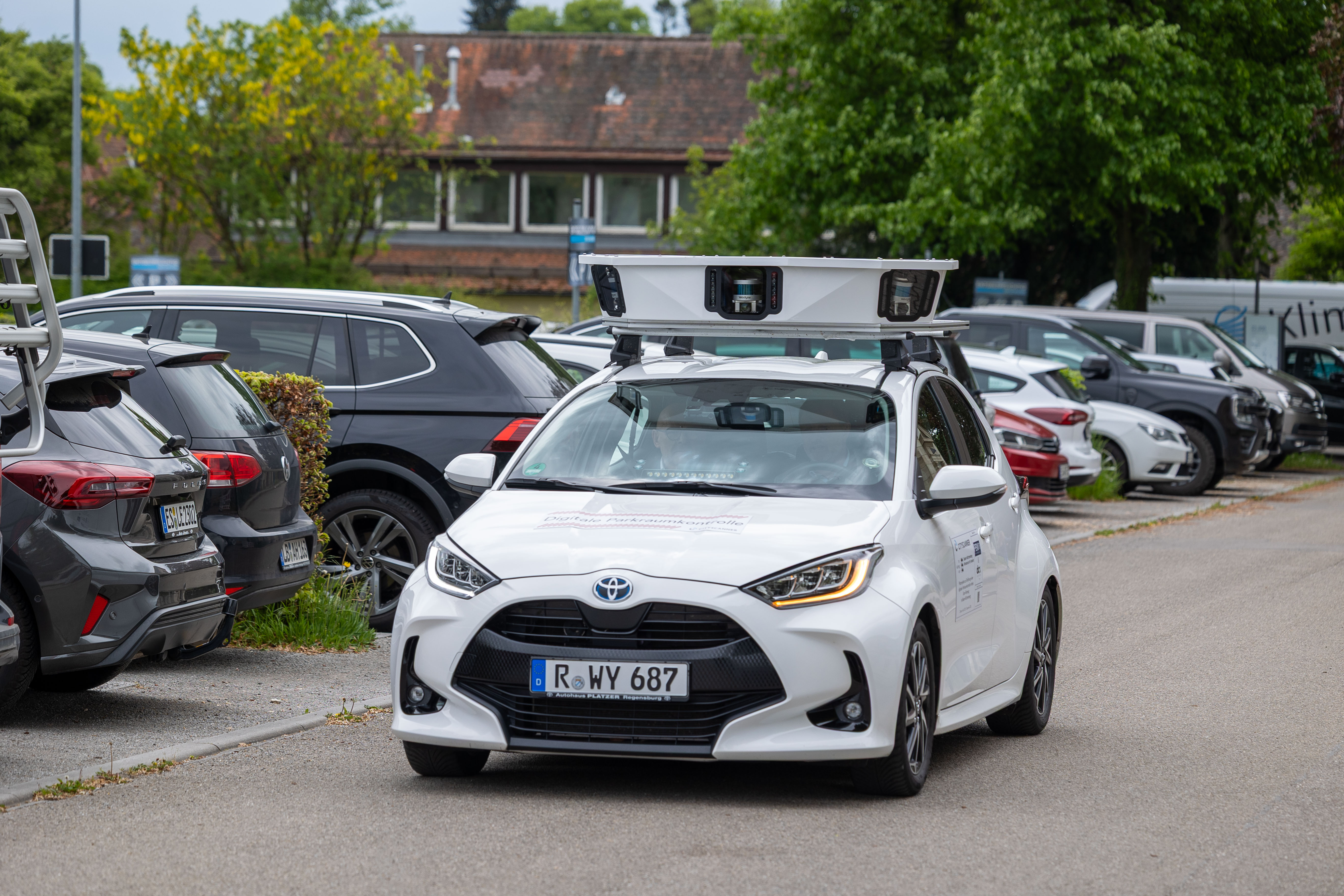This content is also available in: German
Unlocking the Benefits of Fully Digital Parking Enforcement
The German government’s planned revision of the Federal Road Traffic Act is a welcome step towards more efficient and equitable parking enforcement. However, the current draft falls short. The law should allow for the automated verification of parking permits, without the need for on-site human confirmation.

Preface
By Wolfgang Aichinger, Project Manager for Municipal Climate and Transport Policy at Agora Verkehrswende
The risk of being caught without a parking permit is low in many places in Germany. Low enforcement frequency is one cause – officers patrolling on foot can only check between 90 and 150 vehicles per hour; and staffing shortages are common, as parking enforcement is far from a dream job. In addition, relatively low fine levels (between €20 and €40) do little to deter drivers. Accordingly, there can be greater incentive to park illegally than to comply with the rules.
A different picture emerges in the many European cities that already use scan vehicles for parking enforcement. These vehicles can check around 1,000 parked cars per hour by comparing scanned licence plates with a database of valid parking permits. This approach not only streamlines enforcement but also makes it easier for drivers to find available spaces. Stricter enforcement encourages greater reliance on off-street parking (e.g. in parking garages), which reduces the number of cars circulating in search of a spot. It also serves as a strong deterrent to double parking – a common practice in German cities that endangers cyclists and disrupts bus traffic.

Enabling fully digital parking enforcement
Public officials across Germany recognise the advantages of using scan vehicles for parking enforcement. However, Baden-Württemberg remains the only German state to have enacted regulations permitting their use. Planned amendments to the Federal Road Traffic Act aim to introduce nationwide rules for processing data collected by scan vehicles. These changes would enable local authorities nationwide to implement the technology while preventing a patchwork of inconsistent regulations at the state level. Nevertheless, the draft version of the Act proposed by the Federal Ministry of Transport still requires parking officials to perform on-site verification whenever a vehicle is flagged as illegally parked.
One justification for this provision is that individuals with severe disabilities may hold a valid parking permit in paper form, as expressly allowed under EU law. In such cases, a fully digital check would erroneously determine the vehicle is illegally parked, thus leading to a wrongly imposed fine. Cities such as Amsterdam and Vilnius have addressed this issue by introducing dual systems that require parking permits to be registered digitally as well. This approach not only ensures compliance with EU regulations but also greatly improves the accuracy of digital parking enforcement.
While there are still a few instances in which a digital check might fail to produce a clear result – for example, when a licence plate is dirty or partially obscured – these uncertainties can typically be resolved based on supplementary photographs of the vehicle. Consequently, the requirement for on-site visual verification should be removed from the revised Federal Road Traffic Act.
Over the medium term, introducing digital parking permits for people with severe disabilities could deliver various benefits, including a user-friendly solution that is uniform across Europe. A consumer app that is connected to a centralized database of parking permits would not only ensure convenience for users but also eliminate the fraudulent use of individual parking permits across multiple vehicles. To advance this goal, the German government should advocate for corresponding amendments to road traffic law at the EU level.
Preparing municipal government for digital parking enforcement
While the federal government is laying the legal foundation for digital enforcement, local authorities can already start preparing for its implementation. With the exception of a few pioneering municipalities, local authorities still rely on analogue systems. In Berlin, for example, it often takes several weeks to process applications for resident parking permits. In Hamburg, by contrast, drivers can apply for a resident parking permit online and receive the permit as a downloadable QR code.
What are the requirements for a system based on scan vehicles? Pilot projects in Baden-Württemberg show the way forward. Important prerequisites include the digitalisation of all parking permits; the upgrading of parking ticket machines; and the creation of digital interfaces between all relevant authorities (e.g. police, municipal government, and parking enforcement).
Pilot projects also highlight the importance of starting early with communication measures to inform residents, commuters, and visitors. State governments can support local municipalities in carrying out these efforts. Special-purpose associations (such as those established for traffic monitoring in Bavaria) can be particularly valuable in rural areas – for example, by providing member municipalities with centralized access to scan vehicles.
Revising the traffic fines schedule
Aside from patrol frequency, fine severity is a crucial factor for effective parking enforcement. Many drivers deliberately accept the risk of incurring a fine of €20 to €40 for parking in a marked space without a valid permit or for parking illegally in a no-parking zone. In several neighbouring countries, fines are significantly higher. For instance, in the Netherlands, a driver without a parking permit faces an €80 fine, while parking in a no-parking zone carries a €120 penalty. For this reason, alongside the revision of the Federal Road Traffic Act (StVG), it would be prudent to update the traffic fines schedule and to regularly adjust fine levels in line with inflation.
While amending the Federal Road Traffic Act, the German government has an opportunity to improve another aspect of parking management – namely, the cost of resident parking permits. These permits provide residents with the right to park in controlled or restricted zones. An ever-greater number of local authorities have been introducing higher charges for this type of permit.
Such increases have a disproportionate impact on low-income residents. While this is often cited as an argument against higher permit fees, only around 2% of households in Germany are both very low income and reliant on personal vehicle ownership. Section 6a of the Federal Road Traffic Act authorises state governments to regulate fees for resident parking permits. These rules should be adjusted to allow staggered fees that vary according to socioeconomic criteria. This would make the issuance of resident parking permits more socially equitable.
The Federal Ministry of Transport has an opportunity to considerably enhance the Road Traffic Act by making amendments in two key areas – first, by eliminating the need for on-site visual checks; and second, by allowing a differentiated fee schedule for resident parking permits. These changes would ensure more effective parking enforcement while also promoting social equity. As part of a public hearing of civil-society associations, Agora Verkehrswende issued a statement that makes corresponding recommendations to legislators. Clearly, to insist on the visual inspection of parked cars means turning a blind eye to successful practice in other countries.
This article was originally published in German as a guest contribution to the Berlin daily Tagesspiegel Background: https://background.tagesspiegel.de/verkehr-und-smart-mobility/briefing/auf-vollstaendig-digitale-parkkontrollen-setzen

